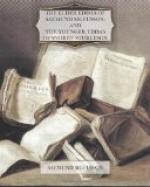15. Go now ever where calamity may be, and no harm shall obstruct thy wishes. On a stone fast in the earth I have stood within the door, while songs I sang to thee.
16. My son! bear hence thy mother’s words, and in thy breast let them dwell; for happiness abundant shalt thou have in life, while of my words thou art mindful.
THE SONG OF THE SUN.
This singular poem, the authorship of which is, in some manuscripts, assigned to Saemund himself, may be termed a Voice from the Dead, given under the form of a dream, in which a deceased father is supposed to address his son from another world. The first 7 strophes seem hardly connected with the following ones, which, as far as the 32nd consist chiefly in aphorisms with examples, some closely resembling those in the Havamal. In the remaining portion is given the recital of the last illness of the supposed speaker, his death, and the scenes his soul passed through on the way to its final home.
The composition exhibits a strange mixture of Christianity and Heathenism, whence it would seem that the poet’s own religion was in a transition state. Of the allusions to Heathenism it is, however, to be observed that they are chiefly to persons and actions of which there is no trace in the Odinic mythology, as known to us, and are possibly the fruits of the poet’s own imagination. The title of the poem is no doubt derived from the allusion to the Sun at the beginning of strophes 39-45.
For an elaborate and learned commentary, with an interlinear version of “the Song of the Sun,” the reader may consult “Les Chants de Sol,” by Professor Bergmann, Strasbourg & Paris, 1858.
1. Of life and property a fierce freebooter despoiled mankind; over the ways beset by him might no one living pass.
2. Alone he ate most frequently, no one invited he to his repast; until weary, and with failing strength, a wandering guest came from the way.
3. In need of drink that way-worn man, and hungry feigned to be: with trembling heart he seemed to trust him who had been so evil-minded.
4. Meat and drink to the weary one he gave, all with upright heart; on God he thought, the traveller’s wants supplied; for he felt he was an evil-doer.
5. Up stood the guest, he evil meditated, he had not been kindly treated; his sin within him swelled, he while sleeping murdered his wary cautious host.
6. The God of heaven he prayed for help, when being struck he woke; but he was doomed the sins of him on himself to take, whom sackless he had slain.
7. Holy angels came from heaven above, and took to them his soul: in a life of purity it shall ever live with the almighty God.
8. Riches and health no one may command, though all go smoothly with him. To many that befalls which they least expect. No one may command his tranquillity.
9. Unnar and Saevaldi never imagined that happiness would fall from them, yet naked they became, and of all bereft, and, like wolves, ran to the forest.




